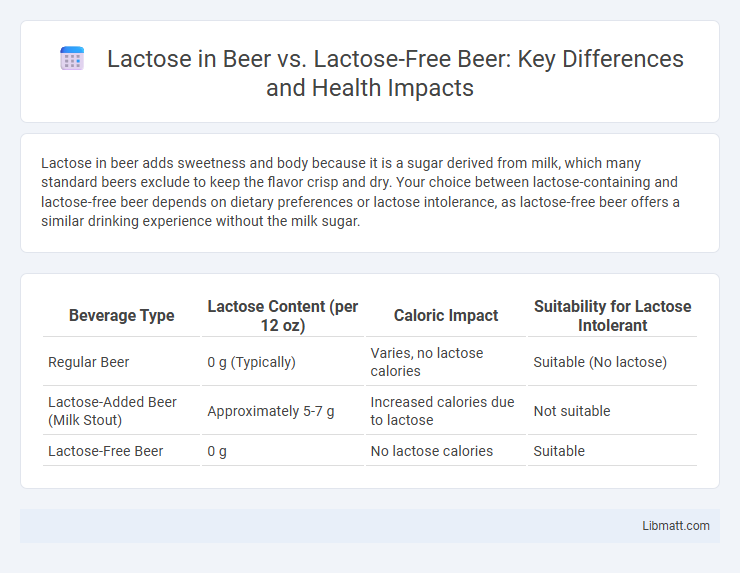Lactose in beer adds sweetness and body because it is a sugar derived from milk, which many standard beers exclude to keep the flavor crisp and dry. Your choice between lactose-containing and lactose-free beer depends on dietary preferences or lactose intolerance, as lactose-free beer offers a similar drinking experience without the milk sugar.
Table of Comparison
| Beverage Type | Lactose Content (per 12 oz) | Caloric Impact | Suitability for Lactose Intolerant |
|---|---|---|---|
| Regular Beer | 0 g (Typically) | Varies, no lactose calories | Suitable (No lactose) |
| Lactose-Added Beer (Milk Stout) | Approximately 5-7 g | Increased calories due to lactose | Not suitable |
| Lactose-Free Beer | 0 g | No lactose calories | Suitable |
Understanding Lactose: What Is It?
Lactose is a disaccharide sugar derived from milk, consisting of glucose and galactose molecules. In beer production, lactose is often added to create sweetness and enhance mouthfeel, especially in styles like milk stouts, since standard beer yeast cannot ferment lactose. Lactose-free beers omit this sugar to cater to lactose-intolerant consumers, ensuring no residual lactose remains while maintaining flavor through alternative ingredients.
Why Is Lactose Added to Beer?
Lactose is added to beer primarily to enhance sweetness and body, providing a creamy texture often desired in milk stouts and other specialty brews. Unlike fermentable sugars, lactose remains unfermented by beer yeast, which means it retains its sweetness in the final product, delivering a rich mouthfeel that balances roasted or bitter flavors. Your choice between lactose beer and lactose-free options can affect taste and dietary preferences, especially for those with lactose intolerance seeking a similar creaminess without digestive discomfort.
The Science Behind Lactose-Free Beer
Lactose-free beer utilizes specialized enzymes like lactase to break down lactose into simpler sugars, making it digestible for those with lactose intolerance. Regular beer may contain lactose if added as a sweetener or flavor enhancer, but most traditional beers are naturally lactose-free because the brewing process typically ferments sugars other than lactose. Your understanding of the science behind lactose-free beer can help you make informed choices that suit your dietary needs.
Health Impacts of Lactose in Beer
Lactose in beer, primarily present in milk stouts, can cause digestive discomfort for individuals with lactose intolerance due to the lack of the enzyme lactase needed to break down this sugar. Lactose-free beers eliminate this risk by using alternative sweeteners or processes, making them suitable for sensitive consumers and those aiming to avoid added dairy sugars. While lactose adds a creamy texture and sweetness, its health impacts include potential gastrointestinal issues, making lactose-free options a preferred choice for maintaining gut health.
Lactose Intolerance and Beer Consumption
Lactose in beer, primarily found in milk stouts and other specialty brews, can cause digestive discomfort for individuals with lactose intolerance due to their inability to properly digest lactose. Lactose-free beer eliminates this sugar through enzymatic breakdown or substitution, allowing those sensitive to lactose to enjoy beer without experiencing symptoms such as bloating, gas, and diarrhea. Choosing lactose-free beer is essential for lactose-intolerant consumers seeking to avoid adverse effects while still enjoying the flavors and social aspects of beer consumption.
Flavor Profile: Lactose Beer vs Lactose-Free Beer
Lactose in beer adds a creamy sweetness and fuller mouthfeel that enhances the flavor profile, commonly found in milk stouts and dessert-style beers. Lactose-free beer lacks this sugary sweetness and creaminess, resulting in a lighter, crisper taste with more prominent hop and malt characteristics. The absence of lactose allows the natural bitterness of hops and roasted flavors to shine without the balancing effect of lactose's smooth texture.
Brewing Process Differences
Lactose in beer is added during the brewing process to enhance sweetness and body, as it is a non-fermentable sugar, unlike most brewing sugars that yeast can ferment. Lactose-free beer undergoes either exclusion of lactose or enzymatic breakdown using lactase to convert lactose into fermentable sugars, ensuring the final product contains no lactose. Your choice depends on whether you prefer the creamy mouthfeel lactose imparts or need to avoid lactose due to dietary restrictions.
Popular Lactose Beers and Lactose-Free Alternatives
Popular lactose beers include milk stouts and cream ales, known for their smooth, creamy texture and slightly sweet flavor due to lactose content. Lactose-free alternatives, such as gluten-free beers or those brewed with maltodextrin, offer similar mouthfeel without the sugar, catering to individuals with lactose intolerance. You can enjoy a rich beer experience by selecting from these lactose-free options if you need to avoid lactose.
Consumer Trends: Demand for Lactose-Free Options
Growing consumer demand for lactose-free beer reflects increasing awareness of lactose intolerance and a shift towards more inclusive beverage choices. Lactose-free beer appeals to health-conscious individuals and those seeking allergen-friendly options without compromising flavor and texture. Your preference for lactose-free options aligns with broader market trends favoring gluten-free, dairy-free, and other specialized dietary products.
Choosing the Right Beer for Your Dietary Needs
Lactose in beer is a sugar derived from milk, commonly added to milk stouts to create a sweeter, creamier texture, but it is not digestible by those with lactose intolerance. Lactose-free beer eliminates this sugar, making it suitable for individuals with lactose intolerance or dairy allergies while maintaining flavor through alternative brewing methods. Choosing the right beer involves checking ingredient labels and considering personal digestive health to avoid discomfort and enjoy a safe, flavorful beverage.
Lactose in beer vs lactose-free beer Infographic

 libmatt.com
libmatt.com